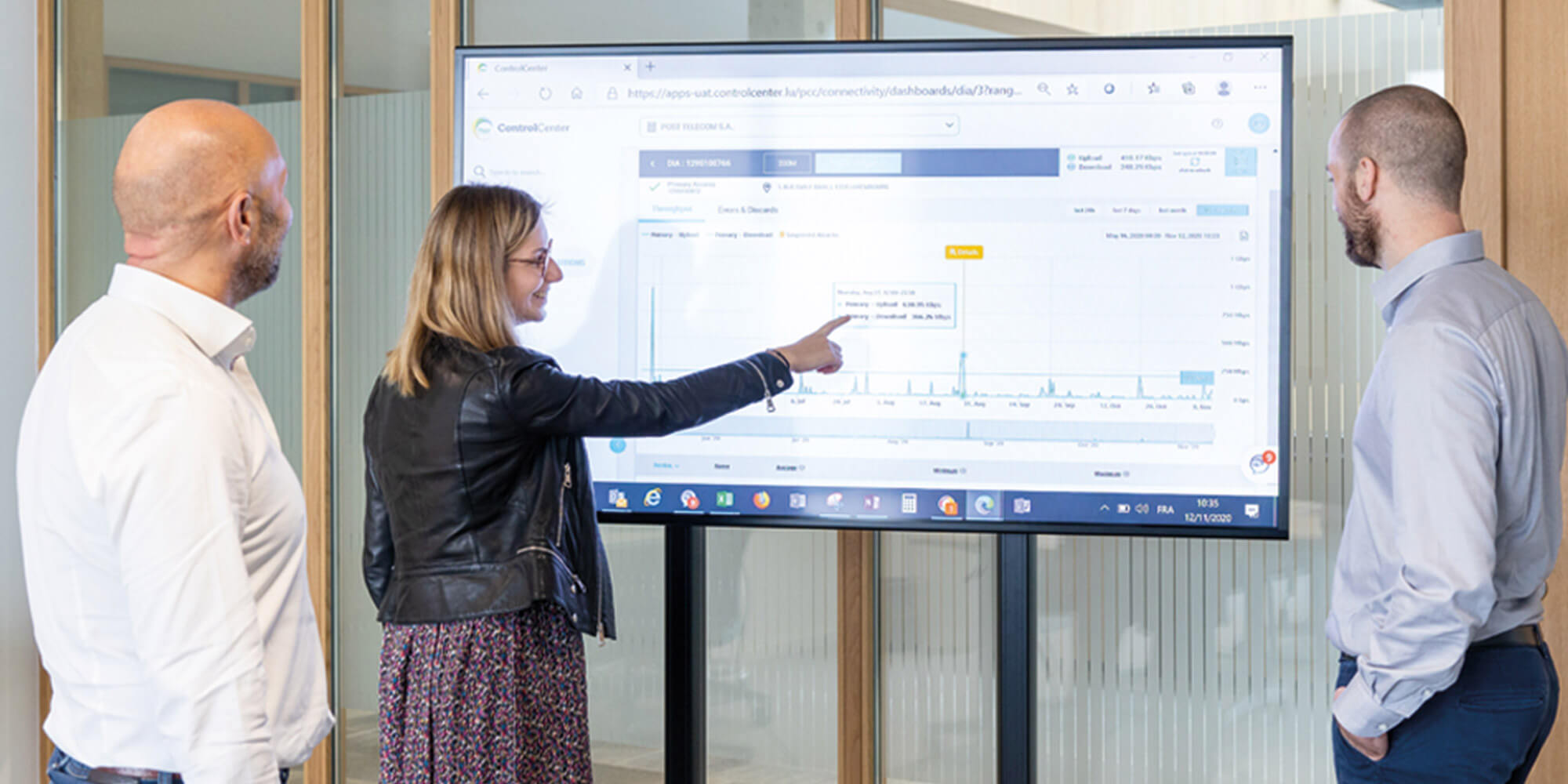Keeping constant watch over your business connectivity - DEEP
Keeping constant watch over your business connectivity
04 November 2021

Connectivity is now an essential part of running a business. In order to be successful, a company must ensure that its users can connect easily and access the company’s digital resources, as well as guaranteeing that its customers have access to the services it offers online. With connectivity becoming increasingly vital, companies must be able to control, guarantee and proactively manage their connectivity to support business growth, ensure access to services and user safety, and meet ad-hoc needs.
Today, businesses have access to a range of dedicated connectivity services to improve their resilience. One example is Direct Internet Access, which allows users to benefit from a dedicated connection and adapt the available bandwidth to their needs. It is also possible to set up secondary access (fallback) in case of problems with the main connection.
Monitor your traffic in real time
It is important for IT managers to be able to constantly monitor how connectivity services are being used. Now, through the ControlCenter, they can check the status of services they have subscribed to in real time. From this online console offered free of charge by DEEP, they can monitor the bandwidth consumption of their Direct Internet Access, and check the status of the primary access and the fallback. They have access to smart dashboards, providing all the strategic information they need to manage their connectivity.
Customers can check that the services they have subscribed to are operational at any time, and monitor their consumption and the volume of traffic linked to their activity.
In addition to the transparency we aim to provide to our customers, this data is valuable and helps them adapt the various services to their needs.
Anticipating traffic growth
Let's take the example of an e-commerce player. As part of a promotional or communications campaign, it needs to be able to evaluate and anticipate an increase in traffic and online transactions. With the ControlCenter, it can check on actual bandwidth usage in normal times and assess the capacity to absorb a larger or smaller increase in traffic. Anticipating increases in traffic, where there is a risk of saturation, means that the player can consider ways to increase bandwidth.
In the context of the COVID-19 pandemic, organising remote work meant a different form of traffic management, with increased demands on the infrastructure from outside. Real-time traffic monitoring also helps to ensure an optimal user experience and make communications secure. If the company grows, its traffic will also grow. Having clarity on bandwidth capacity makes it easier to keep up with this growth and, if necessary, upgrade the infrastructure.
Protecting yourself against volumetric attacks
Similarly, the ControlCenter can be used to detect abnormal increases in traffic, for example in the context of a distributed denial of service attack (DDoS). This is where malicious actors seek to cripple a company by using a large volume of illegitimate traffic to saturate its networks. The ability to monitor traffic in real time means that attacks of this kind can be detected. Through the ControlCenter, we can send alerts about suspicious traffic and view data related to such an attack. In order to address such issues, DEEP also offers automatic traffic detection and mitigation services. Malicious solicitations are then blocked to allow legitimate traffic to access the service.
A central interface
With the ControlCenter, users can therefore access all the information they need on a set of services that are inherent to their connectivity (SAN, LAN/WAN) and security. Through the Health service, they also have access to generic data from the DEEP backbone, such as average latency, packet loss, etc.
At DEEP, the intention is to progressively enhance this ControlCenter, with a view to improving the user experience and turning it into a central interface where the company’s connectivity and mobile fleet can be managed. Other functionalities, related to consumption and billing, are also accessible from the portal. The customer benefits from total transparency and can rest assured that they are receiving a high-quality service.
Contact us
Do you have any questions about an article? Do you need help solving your IT issues?
Contact an expert







Our experts answer your questions
Do you have any questions about an article? Do you need help solving your IT issues?
Other articles in the category Telecom
Why and how to manage your network?
With the development of hybrid workstyles, it's essential to implement a robust network configuration manager to effectively manage the network and the large number of connected devices. The solution? The Meraki Dashboard!
Published on
14 May 2024
Ten years of easier business telephony management thanks to CloudPBX
. In the world of business telephony, this new product represented a major step forward, allowing for fixed-mobile convergence, offering greater flexibility to employees and making it considerably simpler to manage in-house telephone systems.
Published on
15 September 2023
ConnectedOffice, the business offer for connectivity
DEEP 's ConnectedOffice is an all-in-one offering that addresses the simple to complex connectivity and networking needs of SMEs
Published on
28 February 2023




